Archives of Event of the Week
Literary Event of the Week: Sugar Reading
"Butter had bound them," Seattle author Anca L. Szilágyi writes in her new chapbook, Sugar. "A mutual love of butter." Sugar is a gastronomic love story about tastes and flavors and agreement and disagreement and all those other factors that make a relationship succeed or fail.

I'd wager that pretty much everyone who has behaved ungenerously in a relationship can see themselves in the opening lines of the book: "He couldn’t stomach currants in his salad. She couldn’t stomach his not stomaching her currants."
Set in and around Pike Place Market, Sugar is a kind of fairy tale, with food in place of magic. There are lamb's tongues and artichokes and lakes of butter and French food and other delectables that you can find in the Market. It's a delightful little amuse-bouche of a book, with an ending that will charm Seattleites and tourists alike.
This Saturday, Szilágyi will read Sugar in the Pike Place Market at the showroom of the book's publisher, Chin Music Press. She'll be joined by Seattle poets Montreux Rotholtz and Alex Gallo-Brown, who is publishing an exciting new book at Chin Music next year. This is a great little showcase celebrating local writers and a local press and Pike Place Market itself. It doesn't get Seattlier than this.
Chin Music Press Showroom, Pike Place Market, 380-1947, http://chinmusicpress.com, 3 pm, free.
Literary Event of the Week: Unpresidented reading at University Book Store
Though he seems like a being who lives entirely, eternally in the present, it's actually very important to understand Donald Trump's past — the crimes of his parents, the crimes of his early career, and the shameful way he's behaved personally. A man who'll lie to you two contradictory ways in one sentence doesn't have much faith in the importance of memory, but he's also likely to be a man who is consumed by his own past.
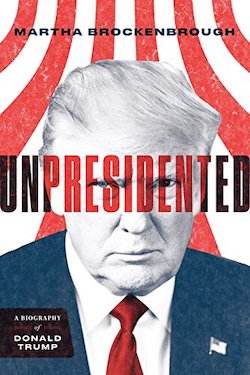
Seattle author Martha Brockenbrough's Unpresidented is a biography of Donald Trump. (She'll be debuting the book this Friday at University Book Store.) Brockenbrough has experience writing for younger audiences, and Unpresidented is a biography with the YA crowd in mind. That doesn't mean the book is dumbed-down; in fact, it means Brockenbrough has to use sharper, clearer language than your traditional both-sides journalism. In fact, the book somehow feels even more damning than most accounts of Trump's life that you've likely read on a news site.
Brockenbrough begins Unpresidented with a history of Donald Trump's tendency to lie about crowd size. She plainly lays out the facts of his life and the lies feel obscene when contradicted in such clear, straightforward English: "...in his ghostwritten book Trump: The Art of the Deal, Trump claims his ancestry is Swedish. This is not true."
I know it seems like a lot to ask someone to read more about Donald Trump in the year 2018, but this one is a very important book if you want to get into the head of the (tragically) most important human being in the world right now, and to comprehend just how often he spreads easily disproven lies, when simply telling the truth would be easier.
University Book Store, 4326 University Way N.E., 634-3400, http://www2.bookstore.washington.edu/, 7 pm, free.
Literary Event of the Week: The Feral Detective reading at Elliott Bay Book Company
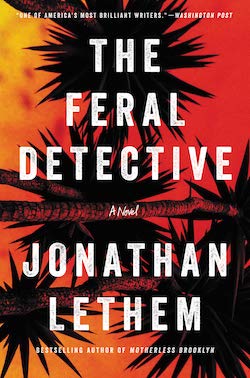
There's a moment fairly early in Jonathan Lethem's new novel The Feral Detective when our narrator, Phoebe Siegler, leans in for a passionate kiss. She rubs the man's hair and runs her hands across his "strong-cabled neck." Then she leans in and, surprising herself, whispers, "Who did you vote for?"
He responds, "Sorry?"
She realizes she blew the moment: "Don't answer, never mind, forget I asked." It's a jarring distraction from a sensual moment, the insertion of politics to a moment where politics doesn't belong.
That's kind of what reading The Feral Detective is like. It's a crime novel — the kind of detective tropes that Lethem has been playing with his whole career, from Gun, with Occasional Music to *Motherless Brooklyn — but it's one that is still reeling from the election of Donald Trump.
Siegler herself is still trying to understand what it means to live in a country with Trump as president. As soon as she starts to feel normal, reality rears its head and her narration gets scrambled again. Her story starts when she blows up her job: "I'd done everything right," she explains, "like a certain first female nominee we'd all relied upon, even my male friends who hated her, as a cap on the barking madness of the world."
Soon after the election, Siegler's friend's daughter goes missing. She sets out to find Arabella and she enlists the help of a detective with the brilliant name Charles Heist. The trail leads them to a cult and things go very wrong. Meanwhile, the world around Siegler and Heist falls apart after the election of Trump.
Feral Detective feels like a direct descendent of Pynchon's first detective novel, The Crying of Lot 49. But it also works as a metaphor for how impossible it is to fall prey to suspension of disbelief in the age of Donald Trump. No fictional situation is too ludicrous anymore, now that the real world has tipped over into a bad novel.
It's not really fair to accuse Feral Detective of lacking focus, as that's kind of the point of the book. But it's still not as fun as it could be, nor as compulsively readable as it should be. At certain points in the narrative when Siegler seems to give up hope, some readers might want to follow suit and set the book down.
Feral Detective ultimately reads like minor-key Lethem; unlike, say, the all-consuming sprawl of his underrated Chronic City, Feral Detective feels myopic and small. But even a lesser Lethem book is still worth your time and attention, and at certain points the book erupts into an orgasmic display of imagination and writing bravura. There are enough of those moments to make you almost forget what a shitshow the rest of the world is right now. Almost.
This Thursday, Lethem reads from The Feral Detective at Elliott Bay Book Company. He will undoubtedly have some things to say about the president and fiction and what purpose fiction serves in a time when Trump is president.
Elliott Bay Book Company, 1521 10th Ave, 624-6600, http://elliottbaybook.com, 7 pm, free.
Literary Event of the Week: Do your holiday shopping at an independent bookstore
I know I'm biased, because I come from a bookselling background, but I think a good independent bookstore is one of the most compelling reasons to live in a city. You can tell the quality of a city by its independent bookstore scene.
I don't need to tell you, a reader of the Seattle Review of Books, all this. But you might need a reminder that if you love a bookstore, the best way to demonstrate your love is by buying stuff there — especially during the holidays.
You could do worse in life than to be known as the person who always gives books for gifts. In fact, I'd argue that books are the perfect gift: they're personal and the receiver thinks of the giver the whole time they're reading the book.
Even better, bookstores have these humans called booksellers who work in them. These booksellers are happy to recommend books for you to give to friends and family. These are the kinds of people who love talking about books with people. They love it so much that they choose to do it for a living.
And you can feel free to ask your bookseller anything. There is — trust me — no question too dumb for a bookseller to handle thoughtfully. The dumbest question you can muster is not even likely to be in the bottom three hundred dumbest questions a bookseller of five years has heard.
When you give the gift of books you bought at an independent bookstore, you're really giving two gifts at once. You're giving the book, of course, but you're also investing in a local institution and improving the quality of life in the city you love. I don't know about you, but that's all I want for Christmas.
For more information about the bookstore nearest you: https://www.seattlebookstoreday.com/
Literary Event of the Week: Sexiest Man Alive reading at Vermillion
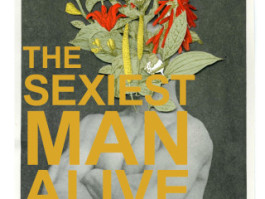
You might know Amber Nelson from her amazing (and sadly now defunct) press Alice Blue. Or perhaps you just see her in the audience at all the best readings in Seattle. Nelson is what we call a Stellar Literary Citizen: she shows up, she contributes, and she promotes the work she likes.
This Saturday, Nelson will debut her second collection of poetry. It's titled The Sexiest Man Alive, and it's inspired by People magazine's annual feature. (This year, People selected Idris Elba as the Sexiest Man Alive, which is a rare case of the magazine getting things exactly right.) It's a book about gender and fantasy and what it means to be sexy, but not in a tawdry way.
This party looks to be a big damn deal, with a DJ and a dance party and a performance from some of Seattle's best drag kings, who will be appearing as some of People's previous Sexiest Men Alive. Performers include starrswagg, who performs hip hop at drag king shows around town.
With Thanksgiving fast approaching, this week is the last full week of readings we'll see in Seattle until after the holidays. That means this party is one of the last big literary blowouts we'll see in 2018. And it's a pretty great book to bow out on: Nelson's poetry is smart and humane and thoughtful and very, very good. We could use more work like this in the coming year.
Vermillion Art Gallery and Bar, 1508 11th Ave., 709-9797, https://www.facebook.com/events/299333797329025/, 7 pm, $5.
Literary Event of the Week: South Seattle is where it's at
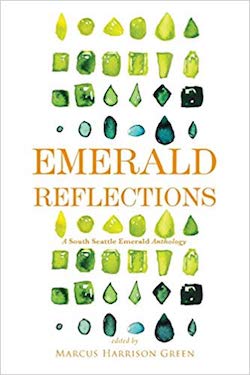
At Third Place Books Seward Park on Thursday night, former South Seattle Emerald editor Marcus Harrison Green, who now writes for the Seattle Times, presents the second anthology of writing from the Emerald, Emerald Reflections 2. It's a celebration of all things south Seattle, by the only site that regularly reports on Seattle's most diverse neighborhoods.
Readers include Green, Tiffani Jones, Rollie Williams, Nakeya Isabell, and many more. If you're a Seattleite and your media diet doesn't include the Emerald, you're missing out on some vital voices.
And then, as if to prove the strength of south Seattle's literary scene, the Type Set coworking space in Columbia City is also hosting a reading on Thursday, featuring local authors Kirsten Sundberg Lunstrum, Michelle Bailat-Jones, and Anca L. Szilágyi.
Type Set wants to set itself apart as a coworking space with a literary bent — they're hosting a very smart and no-frills reading series featuring some of Seattle's most up-and-coming writers. If you see someone read at Type Set, you're likely to hear a lot from that writer in the weeks and months to come.
Unfortunately, both these readings happen at the exact same time, so you have to choose between them. But whichever reading you choose, south Seattle is the place to be on Thurdsay.
Third Place Books Seward Park, 5041 Wilson Ave S, 474-2200, http://thirdplacebooks.com, 7 pm, free. Type Set, 3827C S Edmunds St, https://www.typesetseattle.com/, 7 pm, free.
Literary Event of the Week: Staged Reading of Killing Marias at Rainier Arts Center
When it was published last year, I wrote that Washington State Poet Laureate Claudia Castro Luna's new book Killing Marías: A Poem for Multiple Voices...
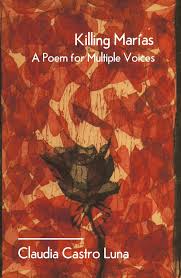
...tries to give voice to the innocent victims of Juarez[, Mexico] — the young women who are killed as a result of the ongoing war of the cartels. Specifically, Castro Luna writes poems about women named María who were killed in Juarez — one poem per victim, with further cues taken from the Litany of the Blessed Virgin Mary.
As I wrote, in Marías Castro Luna serves as "eulogist and a pastor and a biographer and a commentator" for those murdered women, imagining their stories and offering them the dignity of a life that their killers never provided. "She speaks for those who cannot speak," I wrote at the time. "She stands for those women who fell."
Happily, she's still standing. Marías is enjoying a second life. The book has been shortlisted for a Washington State Book Award, and it will be presented as a free staged reading at Rainier Arts Center this Sunday.
With music written and performed by Trio Guadalevín and a dance performance from Milvia Pacheco, this isn't going to be your traditional reading. (Though local writers Donna Miscolta and Catalina Cantú will be unhand to read some of the pieces as well.) This is a multidisciplinary event intended to honor women who lost their lives for no good reason.
This is the kind of event that makes Seattle worthy of the UNESCO title of International City of Literature. It's based on the truth that even a quarter of a world away, even in a world divided by language and culture and politics, we remember. We're witnesses to the lives of those who were lost.
Rainier Arts Center, 3515 S Alaska St, 725-7517, http://www.rainierartscenter.org/, 2 pm, free.
Literary Event of the Week: Three Lit Crawl itineraries
This Thursday is Lit Crawl, the busiest night in the Seattle readings calendar. This year, there are four different readings periods: 6 pm - 6:45, 7 pm - 7:45, 8 pm - 8:45, and 9 pm - 9:45. I thought I'd assemble three possible itineraries for you from the dozens of combinations you could enjoy.
For the Tried and True crawl, full of classic Seattle talent that always delivers, you should start at Hugo House where Rebecca Brown, the smartest writer in Seattle, will read from her new book of stories. Brown will be joined by Richard Chiem, who will be reading from his new novel, and poet JM. Then, stay at Hugo House for a presentation by Frances McCue and Cali Kopczick about the old Hugo House which will also serve as closure for an unfinished event that they put on in the old space. Next, skip over to Barca for a reading from greats including Karen Finneyfrock, Lena Khalaf Tuffaha, Kamari Bright, and Christine Texeira. Finally, end up at Corvus and Company for a reading from Washington State Poet Laureate Claudia Castro Luna, Samar Abulhassan, Natalie A. Martínez, and Jane Wong.
For Multidisciplinary Madness, begin at Narwhal, where poets and cartoonists will mix media in a presentation from Rachel Kessler, Sierra Nelson, and Gabrielle Bates. Next, the Other Coast Cafe hosts "an evening dip into hybridity," which blurs the line between fiction and fact and prose and poetry with Rezina Habtemariam, Corinne Manning, Kym Littlefield, and Ramon Isao. Then, the Capitol Hill library hosts a reading of sci-fi and fantasy stories written by Ray Bradbury. Finally, at Saint John's, writer Peter Mountford presents two stories about BDSM and talks on the topic of writing about kink.
Finally, for an evening with No Platform for White Men, begin at Cafe Solstice, where Nicole Hardy, Michele Bombardier, Brittney Corrigan, SRoB columnist Clare Johnson, and Rena Priest will celebrate Mineral School. Stay put at Solstice for an evening of women writers (including Frances Chiem, Jessica Mooney, Sally Hedges-Blanquez, and Holly DeBevoise) exploring the metaphysical. Then, the African-American Writers Alliance takes over Roy Street Coffee & Tea with writers like Kathya Alexander and Lola Peters. Finally, at Barca, Gramma Press presents the best in envelope-pushing poetry with Catherine Bresner, Kim Selling, Sarah Galvin, and Mary Anne Carter.
For those of you who do not crumble into ancient dust after going to four events in a single evening, there's an afterparty at Hugo House starting — wheeze — at 10 pm.
Thursday night, various locations, https://www.litquake.org/lit-crawl-seattle.html.
Literary Event of the Week: The Slow Art book launch party and Gramma Reading Series #2

I'm not asking for your pity or anything, but sometimes picking one best literary event for every day of the week is difficult business. It requires me to make some really hard choices, and I have to leave a lot of great events out of the calendar.
I've created a sort of streamlined decision-making process that helps with some of the tough calls. For instance, if I have to choose between a great out-of-town author and a local author's book release party, for instance, I'll choose the local author. (This isn't the Touring Author Review of Books, after all.) And if I'm choosing between a recurring event and a unique, one-time-only deal, I'll often bite down hard and pick the single-serving event.
But holy crap, this Saturday is a hard choice.
On the one side, we've got a book release party for Seattle poet (and Seattle Review of Books's September Poet in Residence) Sierra Golden's very first poetry collection, The Slow Art. Golden's book is a poetic account of her time in the commercial fishing industry. (Read my interview with Golden here.) To celebrate her book's debut, Golden will be joined by local poets Maya Jewell Zeller and Sierra Nelson. And a country rock band called Lo-Liner will perform in between the readings.
But then we have the second installment of local publisher Gramma's reading series. The headliner is Pulitzer-winning poet Tyehimba Jess, which is a hell of a coup. Jess will be joined by celebrated Iranian-American poet Kaveh Akbar and Seattle's Civic Poet, Anastacia Renée. So that's a hell of a mix of local and out-of-town talent. And there's more: the evening will also include Moonshine, a diverse cabaret featuring movement and music and exuberant artistic expression.
So that's two events with local ties celebrating local talent with music and readings. How the hell do I pick one over the other? The answer is: I don't. I'm going to leave this choice up to you. See? How do you like it?
Release party for The Slow Art: Artspace Hiawatha Lofts, 843 Hiawatha Pl S, Seattle, 709-7611, http://www.artspacehiawatha.com, 5 pm, free.
Gramma Reading Series #2: Erickson Theater, 1524 Harvard Ave, https://gramma.press/, 7 pm, $12.
Literary Event of the Week: Teaching for Black Lives at Langston Hughes Performing Arts Institute
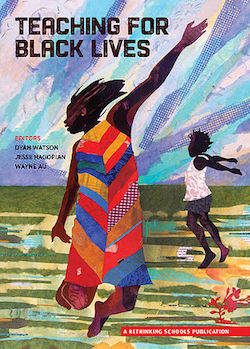
Last week, Macklemore announced that he was teaming up with NFL player Michael Bennett to buy copies of Teaching for Black Lives for "every middle and high school Social Studies and Language Arts teacher in the Seattle Public Schools." It's a breathtaking announcement, a sweeping endorsement that provides the kind of spotlight that only celebrity can offer.
Coedited by local educator Jesse Hagopian, Teaching is a book that calls for educational reform on just about every level. It seeks to replace the current systemic erasure of Black students with a curriculum that values and celebrates Blackness. By raising awareness of stereotypes and encouraging community conversation, Hagopian and the other contributors hope to upend the way racism is taught in our schools.
No single book can fix a system that has largely gone unexamined for decades, of course. But Teaching raises awareness of a situation that too many educators don't even realize exists. It's an important first step toward breaking a chain of violence that stretches back further than the origins of this country.
The reading tonight, which features readings from and discussions of the book, is sold out, but there will be a standby line on a first-come, first-served basis. Go see why this is a book that is about to change this city for the better.
Langston Hughes Performing Arts Institute, 104 17th Ave S. https://www.langstonseattle.org/, 7 pm, $5.
Literary Event of the Week: Laura Da' teaches "Poetry of Place"
In Seattle poet Laura Da's great poem "Passive Voice," she reflects on teaching kids to avoid passive voice using that old trick:
Circle the verbs.
Imagine inserting “by zombies”
after each one.
Of course, if the sentence works with "by zombies," it's in passive voice. But that's not the point of the poem. She goes on to imagine those kids on their summer vacations, traveling the country "on the way home/from Yellowstone or Yosemite." She pictures them getting some fresh air, addled by hours in the car, witnessing roadside attractions.
How she ties these two images together — the passive-voice zombies and the sun-baked highway monuments — is immensely pleasurable and I won't ruin it by summarizing it here.
The interesting thing about the poem is how Da', in a few short lines in the middle of a poem, places the reader so solidly in a place. You don't just imagine the summer road-trip pitstop. You're in it, you're there.
This is a rare talent in a poet. Too often, poets will fail to remember to anchor their poems in space and time, leaving the reader afloat in a mysterious gauzy nowhere. Da' never fails to remind her readers where they are.
That's why she's the perfect teacher for a free class called "Poetry of Place," which is happening in the Capitol Hill branch of the library this Sunday. Da' promises to help her students "look to land and water ways as a source of poetic inspiration."
Whether you're a poetry novice or a published author, this (free!) class is for you. All it costs is two hours of your life. Students are asked to bring a pen and paper or a laptop to write on. Da' will do the inspiration. No maps required.
Seattle Public Library, Capitol Hill Branch, 425 Harvard Ave E, http://spl.org, 2 pm, free.
Literary Event of the Week: Bumbershoot
Seattle has always had a hard time loving Bumbershoot. Some people quit going when the Labor Day arts festival started charging for tickets. (This seems silly to me; it costs money to pay artists and put on a show.) Some people think the big-name acts are too obnoxious. (Okay, but there's Folklife if you want a free nice, well-scaled local festival.) And some people think that the festival is now too unmoored from the city. (Who can say what the city is anymore, anyway?)
People always hate change. It's just how it is. And I try to resist it when people lament the loss of the status quo. But one element of Bumbershoot that has undeniably gotten worse over the years is the festival's commitment to the literary arts. Not too long ago, Bumbershoot brought cartoonists like Harvey Pekar and Allie Brosh to town, or novelists like S.E. Hinton and Ursula LeGuin.
Now, Bumbershoot doesn't even have a literary arts slate. Instead, they have a "Comedy & Conversation" stage, which brings stand-up comedians and podcasters and writers to the festival. On one level, this decision makes sense: writers don't pack 'em in at music festivals. But on the other hand, it's incredibly sad that Seattle's premier arts festival doesn't focus more on bringing world-class literary talent to the city anymore.
But the Comedy & Conversation stage will feature some great local writers who deserve your attention. Some highlights:
- On Friday, Seattle's slam community comes together to fight it out in the Seattle Battle of the Word.
- Youth Speak Seattle presents a program of young writers on Saturday.
- Seattle author Ken Jennings joined local musician John Roderick for a live taping of their modern-world-as-history podcast Omnibus on Saturday night.
- Most importantly, on Sunday Seattle poet and mayoral candidate Nikita Oliver hosts a program called "Think It, Say It, Do It." If I had to pick a favorite event from the full lineup, this would be the one.
Seattle Center, https://www.bumbershoot.com/2018-lineup/
Literary Event of the Week: Seattle Urban Book Expo
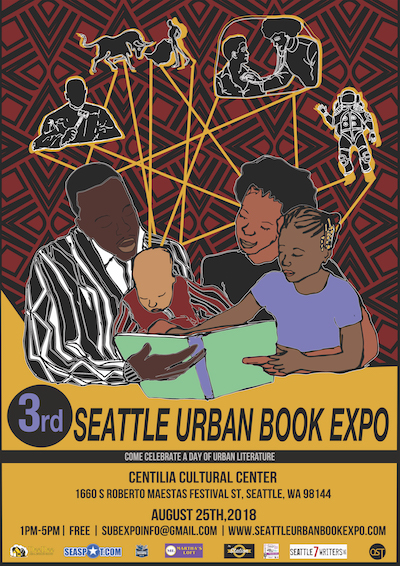
Last year, I interviewed Seattle author J.L. Cheatham about the second edition of the Seattle Urban Expo — his celebration of Seattle-area authors of color and independent authors who often don't get attention in local bookstores.
This Saturday, August 25th, the third annual Seattle Urban Book Expo happens on Beacon Hill. Cheatham plans the expo to be a big party, with food and kids' activities and all sorts of fun events that are intended to keep audiences there for a while. The second expo nearly doubled in size from the first, and the third looks to be the biggest, best one yet.
Don't know what to expect? Donna Miscolta reviewed the Seattle Urban Expo for us. She said only one thing was missing:
I was at the expo for an hour and a half. I think I counted two white people among the visitors during that time...Literary events too often center white writers. It happens in Seattle as it does elsewhere. Take for instance, the San Diego Festival of Books which also occurred last Saturday. Read Aaryn Belfer’s #bookfestivalsowhite. When a literary event centers writers of color, it’s an opportunity for white writers and readers to educate themselves about the lives and stories of black and brown people — an imperative in today’s racially charged climate.
If you're reading this and you're white, you should go and support an underserved community and learn about a whole group of writers who you don't see at literary events every week in Seattle. If you're a person of color, you should go and celebrate a more inclusive literary Seattle. No matter who you are, you should go.
Centilia Cultural Center, 1660 S Roberto Maestas Festival St,973-4298, 1 pm, free.
Literary Event of the Week: Economic Utopias and Dystopias
Say what you will about our Trumpy times — and we started a book club just to talk about how terrible everything is — it is at least refreshing that people are discussing economic systems. I'm old enough to recall a time (four years ago) when discussing socialism would be enough to end a political career. Now, Democrats are openly calling themselves socialists.
Clearly, the current model of economics — call it neoliberalism, call it libertarian capitalism, call it whatever you'd like — isn't working. It's time to evaluate our economy, throw out what doesn't work, and start over. The best way to investigate our options, of course, is through fiction.
On Saturday the 18th, four local sci-fi writers (Beverly Aarons, Shweta Adhyam, Elizabeth Guizzetti, and Seattle Review of Books columnist Nisi Shawl) will discuss "economic systems in literature and how they relate to America’s current economic system." They will be moderated by a local real estate strategist as they discuss utopia and dystopia in sci-fi, and how those ideas can (and shouldn't) be applied to the real world.
That's the first half of the event. The second half is delightfully participatory, as attendees are invited to "work in groups to create their vision of an economic system they would want to leave to future generations." That's right — you get to start from nothing and figure out how you'd allocate resources in a perfect world.
This is one of the most exciting ideas for a literary event I've heard in months: a chance to learn from fiction and apply those beliefs toward the creation of something new. And even if none of the ideas created at this event lead to the foundation of a new economic model, the hosts are serving free drinks and snacks, so you'll be sure to get something out of the event.
Tashiro Kaplan Artist Lofts, 115 Prefontaine Place S, https://www.eventbrite.com/e/economic-utopias-and-dystopias-tickets-48071143083, 1 pm, free.
Literary Event of the Week: Seattle Poetry Slam Sendoff
Seattle's lively slam community has lots of qualities to recommend it. Poets like Elisa Chavez and Troy Osaki are finding great success in both the spoken and written poetry worlds, for instance. Our youth slam community has maybe never been better. And our slam poets win awards on a very regular basis.
But maybe my favorite part of Seattle's slam community is the sendoff party culture that we have. It works like this: whenever Seattle sends a team to represent us in some national competition, the community throws a big party to celebrate the Seattle team's accomplishments and to wish them luck in the fight against other cities. (It's also a fundraiser; it's expensive work sending poets cross-country.) The event is kind of like sports, only there are no concussions and nobody is going to boo you for kneeling for the national anthem.
Seattle traditionally places in the top third of national slam competitions, but this team might go even farther. The four poets representing us in Chicago are io Chanae, Ben Yisrael, Garfield Hillson, and the great Ebo Barton.
This Tuesday night, visit the Royal Room to see the team in action, to get them psyched up for their big poetry fight on the national stage, and to pay for their travel and lodging and beer expenses. It's time to celebrate our community, and to stand up for Seattle artists.
The Royal Room, 5000 Rainier Ave S, http://theroyalroomseattle.com, 8 pm, $10.
Literary Event of the Week: I Am Still Alive reading at University Book Store
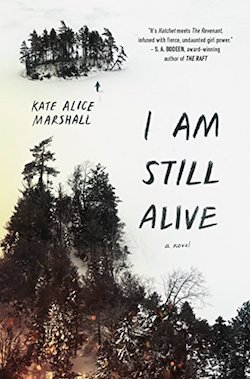
If you're in the mood for an action-packed survival tale, Washington novelist Kate Marshall's I Am Still Alive should be at the top of your list. This is perfect summer reading: the story of a teen named Jess who struggles to survive, with the help of a dog, in the cold Canadian wilderness.
Alive is split into two interwoven narratives. The first is narrated by Jess, still reeling after her mom's accidental death, as she heads to an off-the-grid part of Canada to live with her reclusive dad. And the second is narrated by Jess after a catastrophe: her father is dead, his cabin is gone, and Jess has to figure out how to survive if she's going to get revenge.
This is fun, exciting stuff — and it's also great for young readers. The story unspools through the braided narrative, and readers can slowly piece together the climax of the book through context clues. Jess faces two distinct conflicts over the course of Alive: First, she has to learn to get along with her absentee dad and adjust to extreme rural life. And next, she must figure out how to keep the world from killing her.
Marshall clearly knows her nature. Even the cruelest parts of Alive will make you want to pack up the tent and head for the wilderness. Jess's indomitable spirit is contagious; she reminds readers that no problem is too great to overcome. All you need is brains, endurance, and a ferocious need for revenge.
University Book Store, 4326 University Way N.E., 634-3400, http://www2.bookstore.washington.edu/, 2 pm, free.
Literary Event of the Week: Sick: A Memoir reading at Elliott Bay Book Company
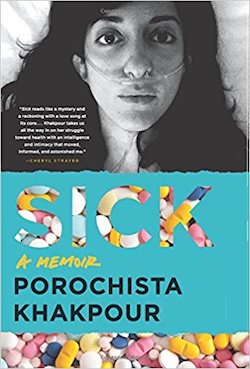
"I have never been comfortable in my own body," Harlem novelist Porochista Khakpour writes in the beginning of Sick, her memoir about life with Lyme disease. "Rather, I've felt my whole life that I was born in the wrong body."
This distance between mind and body, understandably, has always made Khakpour uneasy. And so in some ways, the diagnosis of Lyme disease becomes a convenient metaphor for that distance, for the discomfort she feels inside her own body. This chronic pain and lethargy and weakness at least provides a reason why she might not feel at home in her skin. A few paragraphs later, she concludes:
Because my illness at this stage has no cure, I can forever own this discomfort of the body. I can always say this was all a mistake...I have started to consider that I will never be at home, perhaps not even in death.
Sick is a book that is always bargaining with mortality. Khakpour's story of chronic pain is the story of her existence. "I have been sick my whole life," she says, and the memoir is in many ways about knowing that she'll never know what it means to have good health, that health is the Godot that will never arrive.
When her Lyme disease gets very bad, Khakpour writes cryptic emails to friends asking them to check in on her from time to time. She starts to chafe at friends telling her to "take care of [her]self." She buys a cane. She faints. She tries different drugs. She knows that she'll never recover, which forces her to readjust her understanding of what it means to treat her disease.
Few writers could pull off this kind of a memoir without making it a laundry list of despair. But Khakpour isn't a typical writer: Sick is hypnotic in its examination of bodies in the world, and all the many ways those bodies can (and do) go wrong.
Literary Event of the Week: Hot Off the Press Book Fair
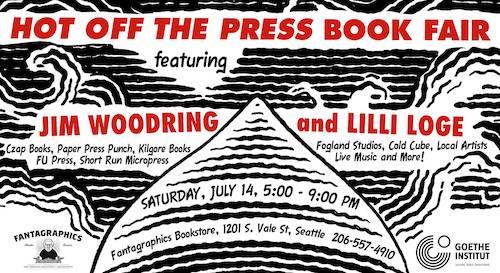
For four years now, Fantagraphics has celebrated summer with a fantastic little laid-back book festival called the Hot Off the Press Book Fair. It's pretty simple: exhibitors set up tables and sell comics in and around the Fantagraphics Bookstore and Gallery. Creators sign books. Comics nerds share the gossip and blab about freelance rates. And then the Georgetown Art Attack happens all around the fair, giving attendees the opportunity to see even more fun stuff.
This year's Hot Off the Press guest of honor is Jim Woodring, who is the best cartoonist in all of Seattle. Woodring is unveiling his brand-new comic Poochytown, which continues the story of his bizarre little cartoon character Frank and his adventures in the Unifactor, a prickly cartoon universe with its own rules and physics.
Woodring is sharing the stage with German cartoonist Lilli Loge, who has created a special Tijuana Bible for the occasion. (If you don't know, Tijuana Bibles were sex comics starring bootleg versions of popular cartoon characters like Mickey Mouse, Popeye, and Dagwood Bumstead.) Loge and Woodring will team up to create a site-specific art installation during the show.
Other Seattle cartoonists including Simon Hanselmann, DW, Marc Palm, Tom Van Deusen, Max Clotfelter, Sarah Romano Diehl, Kelly Froh, Laura Knetzger, and more will be in attendance, selling their latest books. Local publishers like Cold Cube and Paper Press Punch will be tabling at the show, too.
Unlike most shows, which generate a kind of claustrophobic feel, Hot Off the Press feels more like a stoop party. If you get sick of browsing the booths inside, you can step outside and check out the comics on the sidewalk. Fantagraphics supplies the food and drink, Georgetown provides the ambiance, and our best cartoonists offer up the entertainment. Seems like a perfect summer evening to me.
Fantagraphics Bookstore & Gallery, 925 E. Pike St., 658-0110, http://fantagraphics.com/flog/bookstore, 5 pm, free.
Literary Event of the Week: Poets in the Park
Redmond takes its poetry seriously. Like Seattle, they have a poet laureate program (the current Redmond Poet Laureate is Melanie Noel.) But unlike Seattle, Redmond hosts an all-day poetry festival in a city park every summer. You could make the case that Redmond is doing more for poetry as a civic art than any other city in Washington.
This Saturday, Redmond hosts the Poets in the Park celebration, an all-day hoo-hah of activities, readings, and poetry classes that is free to attend. Events include a bookmaking class for kids, poetry mini-golf, and places to create your own poetry themed art.
Readers at Poets in the Park include Washington Poet Laureate Claudia Castro Luna, Julene Tripp Weaver, and Jeannine Hall Gailey. Local organizations represented in the day's readings include Jack Straw Writers, the African-American Writers’ Alliance, and MoonPath Press. Classes include a tutorial on how to do a list poem and a nature walk that doubles as a poetry writing prompt.
Additionally, Redmond indie bookstore Brick and Mortar Books is hosting a book fair in which any poet can sell their books. Publishers like Chin Music Press will also be on hand, along with Poets & Writers and Rose Alley Press.
Seattle doesn't do anything like this. We really should. And we should look to Redmond as an example of how to do it.
Anderson Park, 7802 168th Ave NE, 11 am, http://www.graceguts.com/poets-in-the-park, free
Literary Event of the Week: Side Life reading at Third Place Books
Recently, I've been thinking about the formula for the only two plots in existence: someone comes to town, someone leaves town. Cory Doctorow has made hay of these two story structures, of course — it's the title of one of his books — but that framework also applies to a hell of a lot more than just fiction.
Take, for instance, the internet. When I first came online — I was a late bloomer, this was 2000 or so — you had to go hunt for stuff online. You were a stranger, wandering the internet, going from site to site. Now, of course, the strangers on the internet come to us in our little enclaves: Facebook, Twitter.
Two recent science fiction books have been swallowing my brain and jockeying for attention recently: Bandwidth by Eliot Peper and Side Life by Seattle author Steve Toutonghi. And I think part of the reason I've been thinking so much about these books is that they address this duality of storytelling. In one novel, everything comes to you. In the other, you reach out to everything else.
Here's Bandwidth's description of the feed, a central conceit of the book:
The feed was your personal lens through which to gaze into the digital abyss, the algorithmic curator that delivered what you needed when you needed it from the surfeit. It was the permeable membrane through which you experienced and participated in culture, the arbiter of what you found when you searched and what you discovered when you dipped into the rolling, throbbing cosmos of global conversation. Any individual voice or channel or vector was necessarily partisan. But the feed itself...The feed was infrastructure. Plumbing didn't know or care about a resident's sexual preferences any more than sidewalks pondered the daydreams of pedestrians. The feed was neutral. It was inviolable. It was sacred.
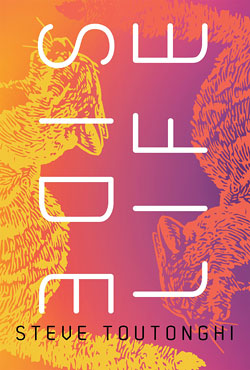
If this model — the future delivered to you via feed — is sacred, Side Life's technology is decidedly profane. Vin, a tech entrepreneur on the skids, accidentally discovers a new technology that moves him out into the universe in new and unexpected ways.
Vin has no memory between blacking out in the crèche and finding himself here. This must be a lucid dream. It pulls at his awareness, requiring attention the way that driving tired does. He's confused and trying to remember who he is. He says to himself, "My name is Vin Walsh." His dream responds with mysterious certainty: "I am Winston Churchill.
When Vin enters these podlike crèches, he finds himself in someone else's body in another time and another place. At first it feels like virtual reality, a game of some sort. But then he discovers he can alter reality in the worlds he's accessing. He's not passive. He's active.
I'm inclined to want to be the someone leaving town, the person walking out into the world, and maybe for that reason the story of Side Life appeals to me more than the one in Bandwidth. But this seems to be the duality we're facing as we move into the future. Are we going to be passive citizens, receiving the information that some algorithm has picked out for us? Or are we going to move about in the universe (or universes,) breaking things and figuring out our role?
Steve Toutonghi reads this Thursday at Third Place Books Lake Forest Park, 17171 Bothell Way NE, 366-3333, http://thirdplacebooks.com, 7 pm, free.